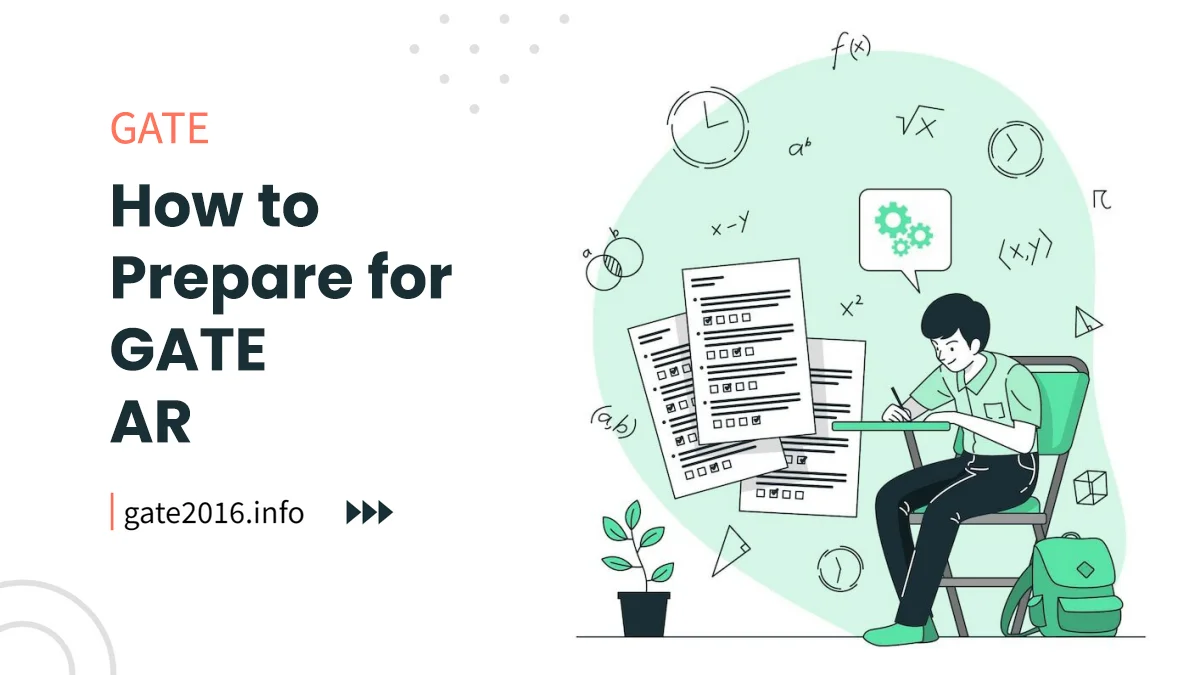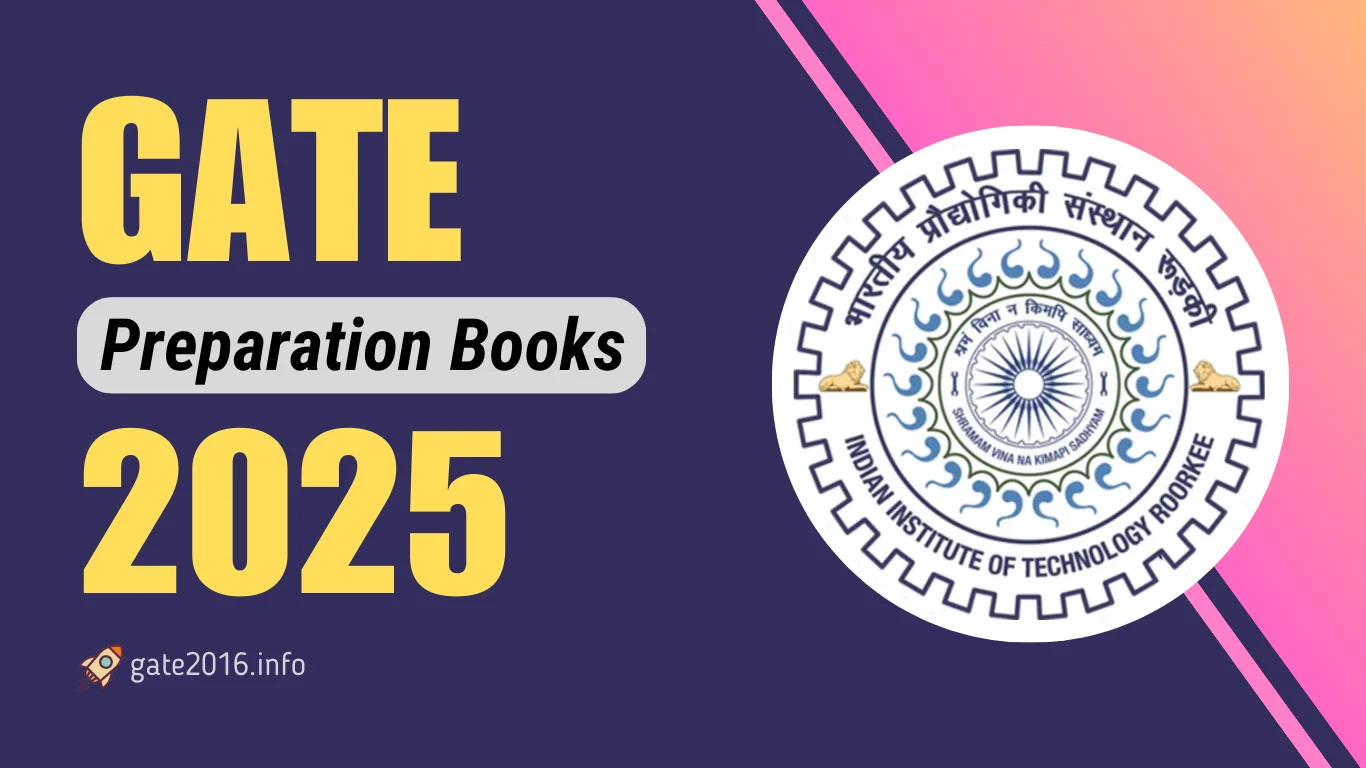Advertisements
Ratings

GATE 2024 AR Preparation – Preparing for the Graduate Aptitude Test in Engineering (GATE) in Architecture and Planning requires a systematic and strategic approach.
This comprehensive guide outlines a step-by-step plan to help aspiring candidates effectively prepare and excel in the GATE Architecture and Planning examination.
Contents
- 1. Introduction to GATE Architecture and Planning
- 2. Understanding the GATE Architecture and Planning Syllabus
- 3. Creating a Structured Study Plan
- 4. Selecting the Right Study Materials
- 5. Mastering Core Concepts
- 6. Enhancing Drawing and Visualization Skills
- 7. Reviewing Previous Years’ Question Papers
- 8. Taking Mock Tests
- 9. Effective Time Management
- 10. Revision Techniques
- 11. Staying Updated with Architectural Trends
- 12. Managing Exam Stress
- 13. Final Weeks’ Preparation Strategy
- 14. Approaching Exam Day with Confidence
- 15. Reflecting on the Exam and Planning Ahead
- Conclusion: Excelling in GATE Architecture and Planning
- Additional Resources and References
- GATE Architecture and Planning Guidance
- GATE Architecture and Planning Preparation FAQs
- GATE Total Information & Guidance
1. Introduction to GATE Architecture and Planning
GATE Architecture and Planning is a platform that opens doors to advanced studies and rewarding career opportunities in the field.
To ensure success, it’s crucial to adopt a comprehensive and organized preparation strategy.
2. Understanding the GATE Architecture and Planning Syllabus
The GATE Architecture and Planning syllabus encompasses a broad range of subjects essential for a comprehensive understanding of the field.
Let’s break down the syllabus into its core subjects and key topics:
Table 1: GATE Architecture and Planning Syllabus Breakdown
| Subject | Key Topics |
|---|---|
| Architecture | Design theory, Architectural graphics, Building materials |
| Building and Structures | Structural analysis, Building construction systems |
| Environmental Planning | Principles of environmental planning, Sustainable development |
| Urban Design | Urban morphology, Public spaces, Urban regeneration |
| Urban Planning | Planning concepts, Zoning regulations, Land-use planning |
| Housing | Housing types, Housing policies, Affordable housing |
| Planning Techniques | Transportation planning, Infrastructure planning |
3. Creating a Structured Study Plan
Developing a well-structured study plan is fundamental to effective GATE Architecture and Planning preparation.
Follow this template to create your personalized plan:
Table 2: Sample Study Plan
| Week | Subjects/Topics | Time Allocation |
|---|---|---|
| 1-2 | Architecture | 12 hours/week |
| 3-4 | Building and Structures | 15 hours/week |
| 5-6 | Environmental Planning | 10 hours/week |
| 7-8 | Urban Design | 12 hours/week |
| 9-10 | Urban Planning | 10 hours/week |
| 11-12 | Housing | 8 hours/week |
| 13-14 | Planning Techniques | 12 hours/week |
4. Selecting the Right Study Materials
Choosing the appropriate study materials is critical for effective GATE Architecture and Planning preparation.
Utilize a mix of textbooks, reference materials, online resources, and mock tests:
Table 3: Recommended Study Resources
| Subject | Books | Online Resources |
|---|---|---|
| Architecture | “Architectural Graphics” by Ching, “Building Construction Illustrated” by Ching | NPTEL’s Architecture and Design courses |
| Building and Structures | “Structural Analysis” by Hibbeler, “Building Structures” by Ambrose | Coursera’s Structural Analysis courses |
| Environmental Planning | “Environmental Planning Handbook” by Platt, “Introduction to Environmental Planning” by Wood | NPTEL’s Environmental Planning course |
| Urban Design | “Urban Design: A Typology of Procedures and Products” by Jon Lang | Coursera’s Urban Design courses |
| Urban Planning | “Urban Planning and Design” by Stein, “Urban and Regional Planning” by Levy | NPTEL’s Urban Planning courses |
| Housing | “Affordable Housing” by Fainstein, “Housing Policy and Practice” by Clapham | Coursera’s Housing Policy courses |
| Planning Techniques | “Transportation Planning Handbook” by Litman, “Urban Infrastructure” by Rojas | NPTEL’s Infrastructure Planning course |
5. Mastering Core Concepts
A strong foundation in core concepts is essential for GATE Architecture and Planning preparation.
Focus on understanding key principles within each subject:
Table 4: Mastering Core Concepts
| Subject | Key Concepts |
|---|---|
| Architecture | Design theories, Architectural representation |
| Building and Structures | Structural analysis methods, Construction techniques |
| Environmental Planning | Sustainable development principles, Urban ecology |
| Urban Design | Urban form and typologies, Place-making principles |
| Urban Planning | Planning concepts, Land-use regulations |
| Housing | Housing typologies, Housing policies |
| Planning Techniques | Transportation planning strategies, Infrastructure design |
6. Enhancing Drawing and Visualization Skills
Drawing and visualization skills are crucial for effective architectural communication.
Focus on improving your ability to convey ideas through sketches, plans, and perspectives:
Table 5: Enhancing Drawing and Visualization Skills
| Skill Development | Practice Activities |
|---|---|
| Architectural Sketches | Regular sketching of architectural elements and concepts |
| Plans and Elevations | Drawing floor plans, sections, and elevations of buildings |
| Perspective Drawings | Creating 3D perspectives of architectural designs |
7. Reviewing Previous Years’ Question Papers
Solving previous years’ question papers is a valuable preparation strategy.
It helps you understand question patterns, time management, and exam trends:
Table 6: Benefits of Solving Previous Years’ Papers
| Benefit | Description |
|---|---|
| Understand Question Types | Identify common question formats and types |
| Time Management | Practice completing the paper within time |
| Exam Pattern Familiarity | Get comfortable with GATE question patterns |
| Self-Assessment | Evaluate your preparation level and progress |
8. Taking Mock Tests
Simulating exam conditions through mock tests is essential for building confidence and improving time management:
Table 7: Benefits of Taking Mock Tests
| Benefit | Description |
|---|---|
| Exam Simulation | Replicate the actual exam environment |
| Time Management Improvement | Practice allocating time to different sections |
| Confidence Building | Boost your confidence before the actual exam |
| Identifying Weak Areas | Identify areas needing further improvement |
9. Effective Time Management
Managing time during the exam is crucial for attempting all questions.
Develop a time management strategy to allocate time to different sections based on their weightage:
Table 8: Time Management Strategy
| Section | Recommended Time Allocation |
|---|---|
| General Aptitude | 15 minutes |
| Subject-specific Sections | 75 minutes each |
10. Revision Techniques
Regular revision is essential for retaining information. Use structured revision techniques to reinforce your knowledge:
- Develop a Revision Schedule: Allocate time for revisiting key topics and concepts regularly.
- Create Concise Notes: Condense important information into easy-to-review notes and flashcards.
11. Staying Updated with Architectural Trends
Staying informed about the latest architectural trends and developments is crucial:
- Follow Industry Publications: Subscribe to architectural journals, magazines, and research publications.
- Engage in Online Communities: Participate in architectural forums and online platforms to discuss recent innovations.
12. Managing Exam Stress
Effective stress management is vital for maintaining focus and composure during preparation:
- Practice Relaxation Techniques: Engage in mindfulness, meditation, and deep breathing exercises.
- Balance Study Routine: Maintain a balanced routine with study time, breaks, exercise, and relaxation.
13. Final Weeks’ Preparation Strategy
As the exam date approaches, focus on targeted revision and improving weak areas:
- Intensive Revision: Dedicate more time to challenging topics and subjects.
- Solve Mock Tests: Practice additional mock tests to simulate the exam environment.
14. Approaching Exam Day with Confidence
On the day of the exam, stay calm and follow these strategies:
- Read Instructions Carefully: Understand the question paper pattern and instructions.
- Manage Time Effectively: Allocate time wisely to different sections based on their importance.
15. Reflecting on the Exam and Planning Ahead
After the exam, assess your performance and plan your next steps:
- Evaluate Performance: Analyze how you performed in different sections and topics.
- Identify Areas for Improvement: Recognize strengths and areas that need further enhancement.
Conclusion: Excelling in GATE Architecture and Planning
Preparing for GATE Architecture and Planning requires dedication, planning, and a structured approach.
By following this comprehensive guide, aspiring candidates can increase their chances of excelling in the examination and pursuing a successful career in architecture and planning.
Additional Resources and References
For additional resources and references, explore the recommended textbooks, online courses, and practice papers mentioned in this guide.
These resources will further enhance your understanding and preparation for the GATE Architecture and Planning exam.
GATE Architecture and Planning Guidance
- How to Prepare for GATE Architecture and Planning: A Comprehensive Guide
- GATE 2025 Books: Architecture & Planning
- GATE Syllabus for AR 2025: Architecture and Planning
- GATE AR Previous Year Solved Papers – (2023-2007)
GATE Architecture and Planning Preparation FAQs
What is GATE Architecture and Planning (AR)?
GATE AR is an examination conducted by the Indian Institute of Technology (IIT) for admission into postgraduate programs in Architecture and Planning and related fields.
It assesses candidates' knowledge and understanding of architectural and planning concepts and serves as a gateway to higher education in this specialized field.
What are the important subjects to focus on for GATE Architecture and Planning preparation?
Key subjects to focus on include architectural design, building construction and management, urban planning, landscape architecture, history of architecture, and building materials and structural systems.
Ensure you refer to the official GATE syllabus for Architecture and Planning to cover all relevant topics.
How should I prepare for the GATE AR exam?
Effective preparation involves creating a study plan based on the GATE syllabus. Use standard textbooks, reference materials, and online resources for each subject.
Practice solving previous years' question papers and mock tests to become familiar with the exam pattern and enhance your problem-solving skills.
Are there any recommended books or resources for GATE Architecture and Planning preparation?
Yes, some recommended books and resources include:
- 'A Global History of Architecture' by Francis D. K. Ching, Mark M. Jarzombek, and Vikramaditya Prakash
- 'Building Construction Illustrated' by Francis D. K. Ching
- 'Urban Planning and Design: Theory and Practice' by Paul Knox and Peter Ozolins
- 'Site Planning' by Kevin Lynch and Gary Hack
- Online courses and lecture videos from reputable institutions and platforms like Coursera and edX.
What is the exam pattern for GATE Architecture and Planning, and how should I approach it?
GATE AR typically consists of multiple-choice questions, multiple-select questions, and numerical answer type questions.
Questions cover various aspects of architecture and planning, including theory and practical applications.
Start by answering questions you are confident about and manage your time efficiently. If you encounter challenging questions, consider skipping them and returning later.
Precision and a strong understanding of core architectural and planning concepts are essential for success in the exam.
Recent Posts
- AAI Through GATE 2024 – JE (Junior Executive)
- M Tech and MS Programs Through GATE and GRE: Navigating Postgraduate Options
- Job Opportunities After GATE 2024 in India: What You Didn’t Know!
- BSPHCL Through GATE 2024 – 40 AEE
Related Tags
How to prepare for gate architecture and planning pdf 2024, How to prepare for gate architecture and planning quora 2024, gate architecture study material pdf free download 2024, gate architecture and planning book pdf 2024, gate architecture and planning book pdf 2024, gate architecture syllabus 2024, career avenues gate architecture 2024, gate preparation books for architecture and planning 2024
| GATE (Reasoning & Aptitude & Maths) Books |
| GATE Guide Books |
GATE Total Information & Guidance
Click below given links to get further information.





